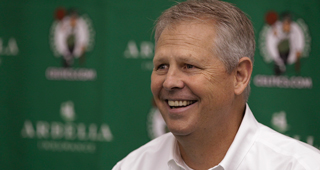At some point during every season of The Walking Dead, a semi-regular character thrashes his way through a host of zombies with no apparent end in sight. The horde simply keeps coming and finally, almost mercifully, the character perishes. Those scenes are a perfect representation of what it’s been like to forecast what Danny Ainge and the Boston Celtics should do with their cache of assets over the last three-plus years.
Every few months, with the cupboard still stocked, we opine whether Ainge should pull the trigger on a deal and move some of the assets that either have or will soon begin depreciating. The cap space, young players and draft picks remain and the trade rumors keep coming in zombie-like waves. Jimmy Butler or Paul George? Simply aren’t walking through that door.
Just a few weeks ago the Celtics and Toronto Raptors were neck and neck in the race for the second seed in the East, but the landscape has changed drastically. The Celtics have surged, the Raptors are struggling and the Cleveland Cavaliers will be without Kevin Love for six weeks following knee surgery. Suddenly, home court advantage through the entirely of the Eastern Conference playoffs seems attainable.
The Celtics, however, don’t hang banners for earning the number one or two seed; they don’t even hang them for conference championships. Whether it’s rational or not, it’s title or bust in Boston.
That’s why the Celtics should play the long game rather than impulsively make a move they will regret. Unless Ainge can trade for a player like Butler or George -- Kevin McHale doesn’t work for the Bulls or Pacers -- Boston should focus on peaking in 2019 when today’s NBA powers will be marginalized.
Such an approach may seem odd, especially since prior to signing Al Horford I advocated for Ainge to part with his assets before they became wasted (and some, like R.J. Hunter and James Young, already have) but the window for contention may soon be blown wide open.
The Brooklyn Nets are far-and-away the worst team in the league, which means the Celtics will have a 25% chance at landing the No. 1 pick as the Pierce-Garnett trade continues to put Ainge in one of the most unique positions in NBA history. Even if they don’t land the first pick, their chances at a top three pick stand at around 65%. There is a real chance the Celtics will draft Markelle Fultz or Lonzo Ball.
Since that Brooklyn pick isn’t going anywhere prior to the trade deadline, mortgaging the long-term (including a host of other first-rounds) for a marginal upgrade isn’t worth the potential risk two years from now when the Celtics should plan to peak. With the Raptors landing Serge Ibaka, it would be easy for the Celtics to overreact based on the assumption that he will at the very least help bring Kyle Lowry, DeMar DeRozan and company out of their February slumber, but why would they?
Let’s look at Ainge’s options.
Whether or not Paul Millsap is on the block, he makes zero sense given the struggles the Hawks had with Millsap/Horford in the frontcourt in the postseason. Jahlil Okafor’s name continues to float around in trade rumors, but he wouldn’t bring the rebounding and rim protection the Celtics desperately need. The same could be said for Denver’s Danilo Gallinari.
Even Carmelo Anthony wouldn’t move the needle enough on the current roster to do significant damage in the playoffs. The biggest win for the Celtics if they were to deal for Anthony would be to make sure he stays away from the Cavaliers.
Luckily for the Celtics, Ainge has shown time and time again that he’s perhaps the most patient NBA executive of his generation. The options available via trade aren’t going to make the Celtics the favorites to win the East -- as long as LeBron James is healthy that title remains in Cleveland -- and even a surprising run to the Finals would pit them against the likes of the otherworldly Warriors or Spurs.
Next summer -- an agonizing five years since the Nets’ trade that kicked off Boston’s grandiose rebuild -- will once and for all be the Celtics’ time. Isaiah Thomas and Al Horford will still firmly be in their primes; Jaylen Brown will have two years of experience under his belt at 21, some combination of Avery Bradley, Jae Crowder, Terry Rozier and Marcus Smart will provide depth, Fultz or Ball will be developing and there will be another round of franchise-changing free agents (Durant, Paul, Cousins, Hayward) to fawn over.



